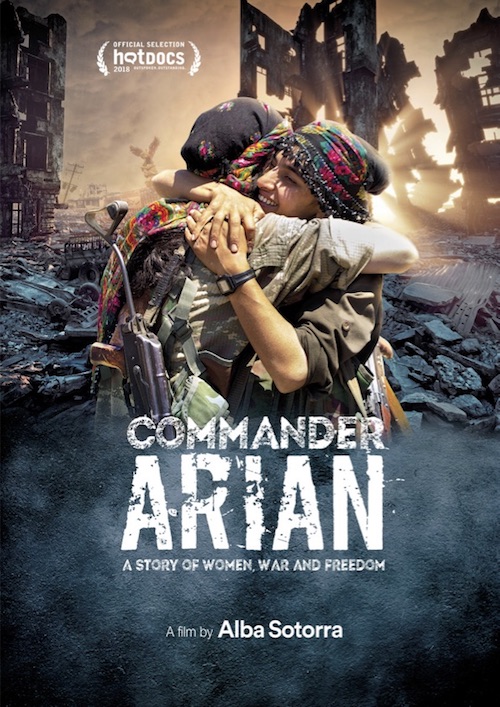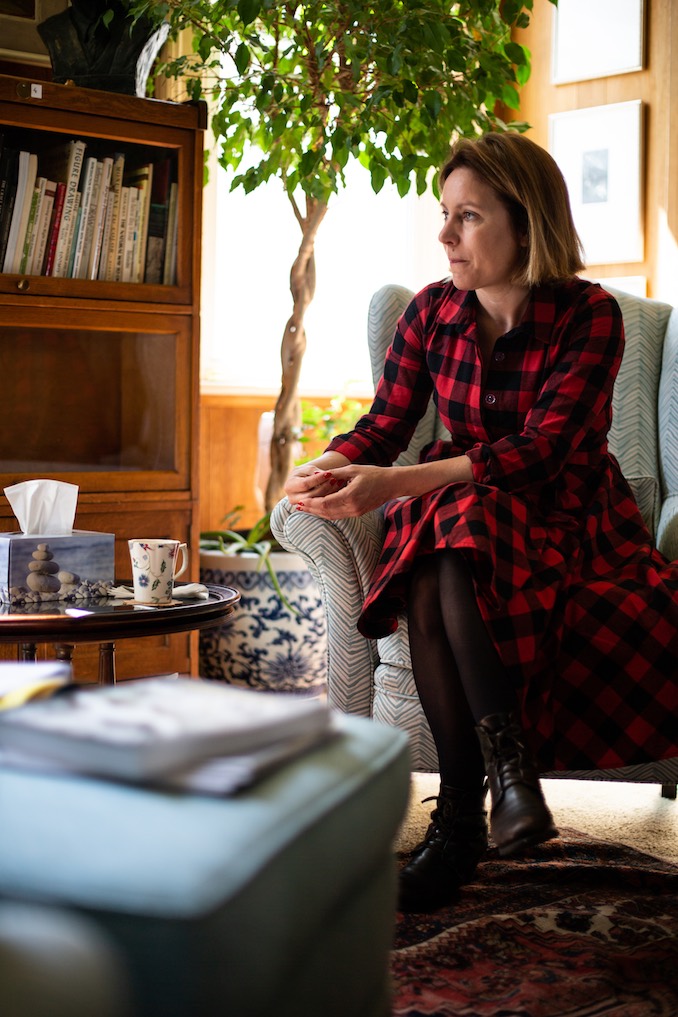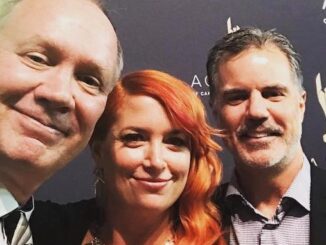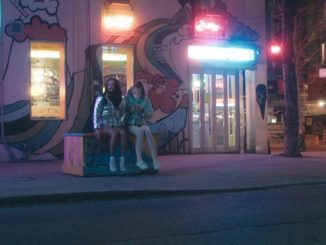Arriving at the Syrian border in Turkey, filmmaker Alba Sotorra has to throw away her suitcase she packed for the trip, she has brought too much. Only her camera and tripod will go with her as she is smuggled across the border in the dead of night. Her first awakening to the struggles here began before she even crossed the border. Soon she will meet with members of the Kurdish YPJ and Commander Arian who will become the focus of her film.

“Commander Arian: A Story of women, war and freedom” is a HotDocs Official Selection for 2018. The documentary is comprised of clips from the multiple trips taken to the region surrounding Kobane by Alba Sotorra. The Spanish filmmaker focused the project on one of the leaders, Arian Afrin.
I got a chance to chat with Alba while she was in Toronto this week promoting her film.
How did you originally make contact, and how did you get to the place where you started filming?
Alba: At that time, 2015, it was, and still now, it’s illegal to enter Syria. Somebody has to smuggle you at night. I have contacts in the Kurdish movement, in the Kurdish community. I didn’t know them in person, but through friends of friends. So, I just ride through Suruç, Suruç is a little town that is next to Kobani.
You could literally see from Suruç the city of Kobani, that was all bombed and besieged by ISIS at that time. We traveled there, and they were waiting for me, and that same night they crossed me. I never had entered in a country illegally before. I had imagined that we would go driving, I don’t know, with a four by four through the mountains. I had not visualized, so I had a suitcase that was completely not suitable for it, and I had to leave everything I had with me, so I could only take the camera and the tripod, and we crossed running in the night.
When you’re out filming with them, did they give you any kind of training for yourself to be there with them?
Alba: I mean, they taught me how to shoot, but that’s it.

What about protection for you?
I didn’t … I don’t have experience in a war zone, so I didn’t even think of taking … I had a dress when I arrived there. So they just, because also that my clothes were not convenient, they just gave me a uniform. There was little training they could give me because also the language was … I mean, at that time I didn’t speak anything. I learned a bit by staying there, but my Kurdish was terrible. It was easy to understand what I had to do, and, basically, I just … I guess they made me a test. In the beginning, I was sent to the front lines when they were really calm. But then, when I started the shooting, they sent me to the place where things were happening, like the active front in the north, where the mission was.
Alba: Yeah. So, it was tense, the place. And I think they said, “You have four days.” And I guess that was like a training for them, to see if I could adapt or not. And those four days were, I mean, they were short, but in the middle of an ambush. And I guess there are people in this kind of situations, when they are afraid, they block, they freeze up.
For me, I’m also scared, I feel fear as everybody, but when I’m afraid, I get very … My head is very clear, so I really … It doesn’t ..show.
So, they saw that I could stand it, and then they let me stay with them.
How long were you there in total?
Alba: In the shooting of the mission, which was in the most front, the first line of the front men, it was a month and a half.
How long in total in Syria?
Alba: I’ve been there five times, and a few times it was two months, more or less. And the other times was a shorter stay, like two weeks.
Now, in terms of the soldiers you met, how young are they? What’s the youngest female fighters that come in as well, compared to the oldest even?
Alba: Yeah, it’s from … I mean, in the fight, it’s 18, over 18. And then, the veterans, maybe, are in their 50s.
Sometimes people say there are younger women, and there are younger women with uniform, but they are only in the bases, where there is no war going on. So, there are younger women who are there because they, in some cases, women who join are escaping from families who are trying to marry them, so they want to be part of the women movement, and they just escape, and they are very young. They don’t know what to do with them because if they let them be taken by the families, the families will marry them, and these girls, they don’t want to be married, they are 16, sometimes even 15, and even younger. So, they take care of them in places that are far away from the war. So, that’s why, sometimes, you see girls that they look really young with the uniform.
And what kind of training do they receive? Some of those as young as 18, do they go to training missions?
Alba: They have the training, it’s in both sites. There is a physical training, they go to sites and they learn skills of, strategic skills in the battle, they learn how to use the weapons, they learn all what has to do with the combat. But they also have a super-strong training on history, politics, and feminism, and they talk a lot about feminism, and why they have to fight.
And what about the food as well? I was thinking about how does the food travel?
Alba: There is not a lot of things to eat sometimes. There is a logistic, there is people that is only in charge of logistics, and they have this task, and they carry the food in the bases, and they get shot all the time. And they don’t have these kinds of cars that are bulletproof. They just drive with their head down, more so because the cars don’t even have glass, the windows have been shot out.
And so, they are really just bringing every day the bread, and some diet things like yogurt. The food there is basically vegetables.
What would a normal meal be?
Alba: In the breakfast, it’s usually similar breakfast, lunch, and dinner. They have this little bit, and everything is shared, and you eat with the bread. No utensils.
There is always tomatoes, cucumbers, and then grilled pepper, and yogurt, and cheese, onions, and olives.
Is meat hard to find?
Alba: Meat comes, but less … Also, they have a methodological reason. The people who’s more advanced in the movement, they are vegetarians because they believe animals shouldn’t be killed.
There’s also fruits, lots of fruits, like watermelons, and …
Are there many relationships that happen within the groups? Between women, or between men and women?
Alba: No, no, this is not allowed.
It’s forbidden?
Alba: There is two ways you can join. If you fully join, it’s something that is maybe difficult to understand here, but it’s like when you give your body to the cause, think of the fight that they are having, it’s a really a heavy fight. So, they are there, ready to die. So, that means to accept that you are leaving your body for an idea that you have.
So, even this other movements that are cast, like the Buddhist, or priest, they are like this. They think the love has to be shared with everybody, it cannot be focused in one relationship because that will distract you from the struggle.
There’s one scene with little kids in there. I think it was in Kobani, maybe, and it’s all broken, and the kids are shooting each other with the foam. What is that, shaving cream?
Alba: Yeah, yeah. The found it in the garbage.
Right after ISIS, there was the ISIS fight against the people in Kobani. And right after that, because all the civilians were, how do you say, withdrawn from the city when the big fight happened.
Right after, this military leaders allowed them to come back, but everything was destroyed, so they were going through the garbage. The kids were playing to find things, that all of this was really dangerous because it was full of mines, still.
So, you will see these kids, like, “Fuck.” But, little by little, the process of cleaning the city took very long because there was a blockade, like Turkey didn’t allow the trucks to come in, so there was no machines to clean.
There was this one scene, I think it was five kilometres away from Kobani, or something, and there’s this scene where there’s three cars coming, and they say, “Cars are coming quickly,” and then there’s an explosion. You can see the smoke, and the smoke comes very, very slow. What was that scene there?
Alba: That was a mortar. Sometimes, the mortars will fall. Mortars?
Yeah, mortars.
Alba: Yeah, yeah. So, in the front line, we were half a mile from ISIS, and mortars reach farther. So, often mortars were falling. So, this is a montage scene, like this mortar didn’t fall exactly at that time, it was another explosion that I didn’t film. But, the most … When they were talking about the cars, it was the most, the thing that were killed … The most accidents we had during the mission was cars that were coming straight to us with bombs.
So, the scene that afterwards, of course, you said you see the mortar because I didn’t film a car. But then, when you see a girl crying, she’s crying because we had an accident with a car bomb that came, and impacted through … There was an ambulance and soldiers, and it killed not only a few soldiers, but those with the ambulance with the two doctors inside.
And that happened, and I didn’t film that because if I would have been there, it would have also been a problem for me.
Does the depression really hit the fighter in the community? How do they deal with those kinds of feelings of self-worth being so low?
Alba: What gives them the strength is the ideas why they are fighting for. They have really, really convinced that the struggle is necessary, and it is for the woman. It’s either, there is not so many choices, so either we win and we achieve the quality we’re fighting for, or we live suppressed.
So, for them, it’s really empowering. It really empowers you to feel that you have your future in your hands, and you have to fight for it.
And in the other hand, it’s, when you lose friends, you also fight for them because you want to make their death, it’s worth something. So, you cannot surrender, you have to keep going, because if you surrender, you will be accepting that they dies for nothing, and that’s really, really empowering.
Yeah, I can imagine. And now, I would like to talk today about what’s happening in Kobani today.
Alba: Today, Kobani’s rebuilt. There is new buildings, people … The civilians came back, the shops open, and the life at Kobani is back. And not only Kobani, but all the division in the north, and the most interesting part is that this woman implemented a system, a political system, that is feminist. So, we have a parity, complete parity because there are quotas. So, all roles, that have to do with decision making, are duplicated, so there is a woman and a man. So, there is a mayor for Kobani, and a mayor man, and a mayor woman.
And then, there is all the … Not only in the region, they have a president man and a president woman.
And what’s going on now with the Turks as well there? They have always been a big problem with Kurds, so I know now, for some reason, Turkey is in Syria
Alba: They entered Afrin, which is a region that is also a Kurdish region. It was pretty disturbing that that happened because in this region, in Afrin, the war never got heated, it was a region that was still peaceful. The economy was going well. Also, they were hosting a lot of refugees, people who were internally displaced people, who came from, escaping from the war, Arabs, Assyrians. It was a place still safe.
But they destroy the city of Afrin, and they took over. And the worst is that they used members of militants, This is a country that is part of NATO. But they team up with radical Islamic groups to enter the city. And now, they are there with this big beards.
I’m like, “Come on, we have to remove them there.” There was a feminist power, a power of democratic there, why we allow this to happen?
Do you think the Turkish will keep funding, and keep pushing these kind of groups into the region?
Alba: They are doing it.
Will they continue to attack the Kurds?
Alba: They are only for the sake of this for them, it’s like the enemy for them is not ISIS, it’s never been. The enemy for them is the Kurds.
Although, the Kurds are fighting for democracy, which is much more similar to the things we defend. And they are allies, and they’ve been allies in the fight against ISIS for the U.S. and for the Europe.
Yeah, and now, they prefer to fund this Islamic radical groups for these people have.
Is Kobani gonna be a target of these kind of Turkish groups?
Alba: Now they say they are going to expand to Manbij and keep going because they want to erase all the Kurds.
But, I don’t think they will. The resistance in Kobani is really strong, and they showed before how they can persist because that’s what they do. Their story is not people who will attack, but they are really strong at other systems. So, if they are attacked, they will defend themselves with all. They will be there until the last person is gone.
There’s one scene too in there, like on an iPad, and they have the village’s positioning, the spots and stuff. How does that information travel?
Alba: It’s quite sophisticated, and it became even more sophisticated when the U.S. came in. But for the iPad scene, it’s the people in the front lines, they are all connected, so they keep updating this map that is shared, and they have internet through satellite.
And what was really amazing was how they call the planes. We were advancing in the mission, once we got in an ambush. It was a group of ISIS that surrounded the house that we were in. I didn’t realize we were being surrounded until I see that they were making holes, first there, first there, and then they start to make holes behind you. I was like, “Fuck.”
And they were calling, “If they cross, they will close our roads.” A big group of ISIS people entered a house not far away from us, they called a plane, and in few minutes, a plane came and bombed that house.
Now, are you still in contact with Arian?
Alba: We had a Skype yesterday that we share.
Okay, crazy. Has she seen the film?
Alba: Yeah!
Now is there a lot of the support that came from ally groups like America? Has that support dwindled? Has there been less U.S. support more recently?
Alba: Yeah. I mean, what happened, the U.S. doesn’t want to get in trouble with Turkey, I guess. There is a lot of economic interest, and also, they do a lot of deals, like in arms selling.
Yeah, that’s pretty sad. Erdogan is a crazy guy I think.
Alba: Crazy.
And Putin, there are so many, so much adrenaline and testosterone there. So, these guys are Bashar Al Assad, Putin, and Iranians too, they’re all crazy.
It’s interesting to point out that although the war, and although the kills, and although that they are blockade economically, Turkey built a wall, there is a wall, like in Palestine, a fence, huge, made with lots of cement, to separate the Kurds from Turkey but the other side, there are also Kurdish people. So, they cut this because they don’t want people to go in, to cross, while they never did it when ISIS was at the border.
But for ISIS crossing was easy?
Alba: Yeah. They have the door open. I couldn’t cross, it was dangerous for me to go through that door because you have kidnappings, but they were crossing, it’s like, “Fuck.”
Yeah, something’s going on with Turkey and ISIS for sure. There’s some relationship there.
Alba: Of course there is.
Yeah. they are buying the oil or something?
Alba: They do. They have, they have. But, basically for them, I think they want to defeat Bashar, and ISIS is also does not want Bashar, and basically they want to use ISIS to stop him.
It’s like a proxy war, yeah, yeah. It’s pretty wild.
Alba: So, just to say what I mentioned before, that although these kills, these women achieved to make in a region, to liberate a region from the kills of the war to make it peaceful, and to create a system, political system, that is democratic. So, they have democracy, which never happened before with Bashar Al Assad. They make a democratic place, gender equality, so women and men now have the same rights, and they have voice, political voice. They have an ecological idea as well, so they are trying to implement ecological solutions, they don’t have means, but they are trying to provide education for society, but not only for the kids, but also for all the people that don’t know how to read and write. So, they are providing education.
And they are getting shelter to a lot of internally displaced people without the help of United Nations because, since they are not a country, they cannot receive the help. So, they are really, really doing an amazing job that I think we should recognize, and point out, and try to help them.
What is your view on the recent strikes there, and Assad’s use of chemical weapons? Do you believe this to be true?
Alba: I mean, it’s really silly from Bashar to do this, and I have no opinion on that, I have no idea. I’ve seen a lot of lies being reported because, when I’m there and they report something that you can … I mean, only if you’ve been there you can know. So, in this case, Bashar, he’s a criminal, so he’s able to do things, and he’s shown, and there are proofs that he’s done terrible things in the past. At this moment, I don’t think it’s strategic, so my logic tells me, makes me doubt. It’s not a strategical tactic, it does not make any sense.
But the thing is that when that was the chemical attack, and the U.S. said, “Oh yeah, we have to bomb him.” But what about what happened in Afrin with the allies? Now they killed, they bombed … Of course, they were not chemicals, but they were bombing a city with civilians, and nobody said absolutely anything.
And that made me really mad.
Yeah, it’s frustrating. 60 to 100 people die from a chemical, meanwhile 100 thousand, 200 thousand die of bombings, but they pay no attention to that.
Now you’re back in Toronto, do you have any plans to go back, to visit again, to start another movie down the road?
Alba: I will … Anna Campbell is this English woman that was killed in the field, who were really, really friends, and that happened in March. And at that time, I just wanted to go too because I wanted to stay with her friends. It’s really strange to cry for somebody just being alone in a place that nobody knew her. And so, I was allowed to go, and they said, “No, no, now it’s not time to come.” I’m just waiting to have the chance to go.
Do you have any ideas for another film, or another story?
Alba: Yeah, yeah, yeah, yeah. There is a few ideas I have that I want to shoot in the Middle East with friends there, and with local leaders because they made. They have a film commune that is made to promote, to learn, to teach the new generation there what is the importance of cinema, and how you can use cinema to communicate things to the world. And I want to, I mean, I’m part of this, and I want to help to make things. So, I want to spend full time there and help and hopefully make a film. So, that’s one project I have so soon. And then, I’m gonna be shooting a film in Barcelona.
Toronto Screenings
World Premiere – Sunday April 29, 6:30pm – Scotiabank Theatre #4
#2 Screening – Monday April 30, 10:30am – TIFF Bell Lightbox 2
#3 Screening – Sunday May 6, 6:15pm – Aga Khan Museum




